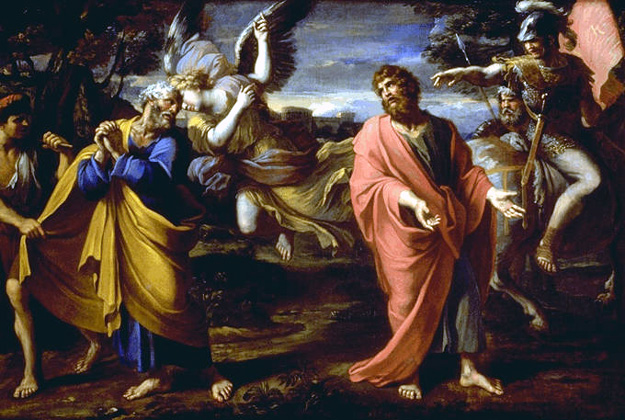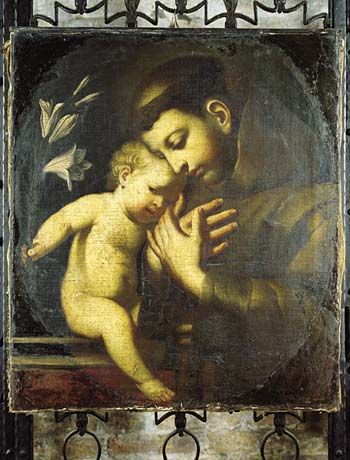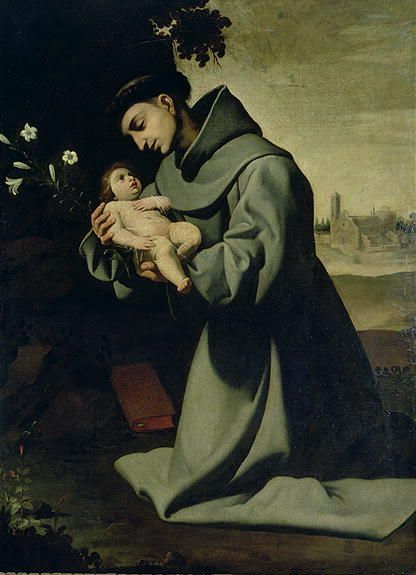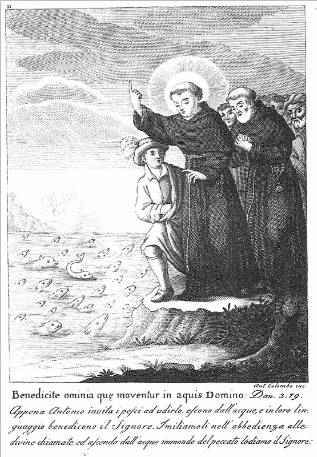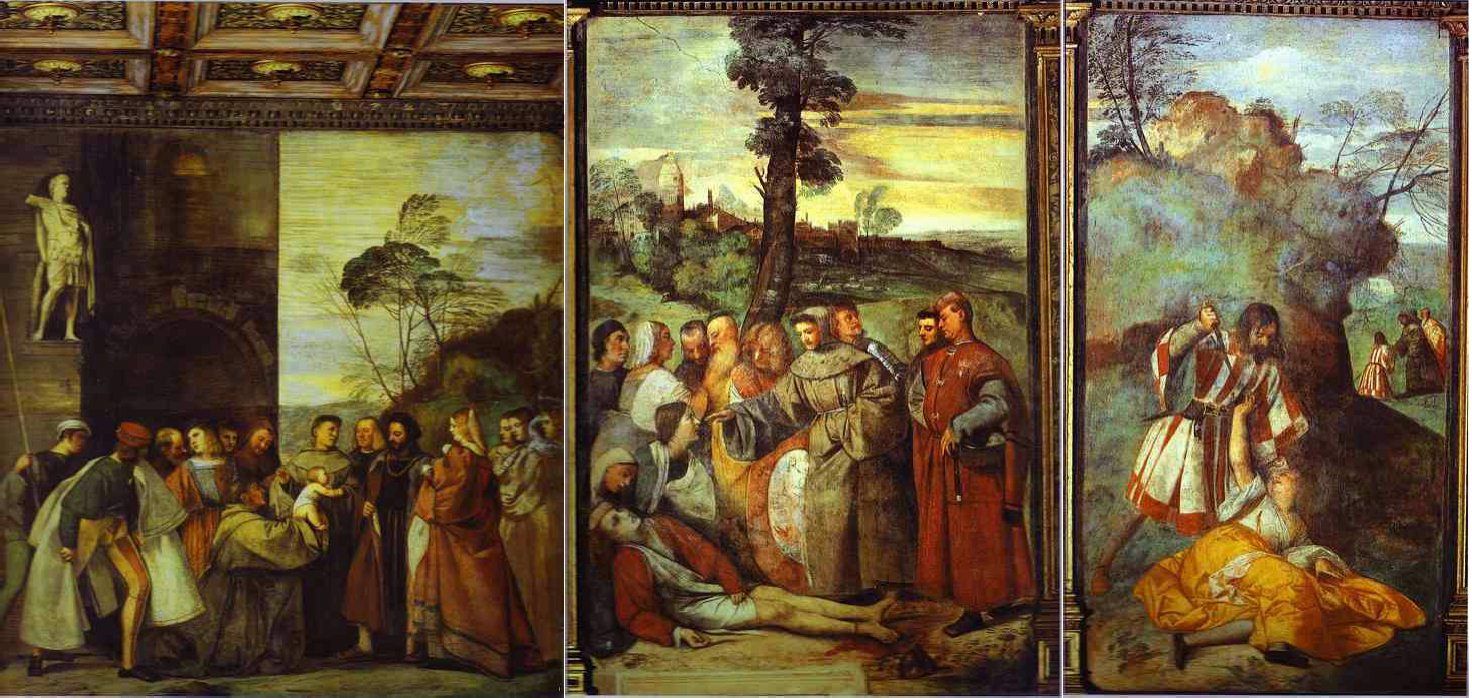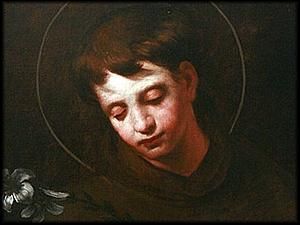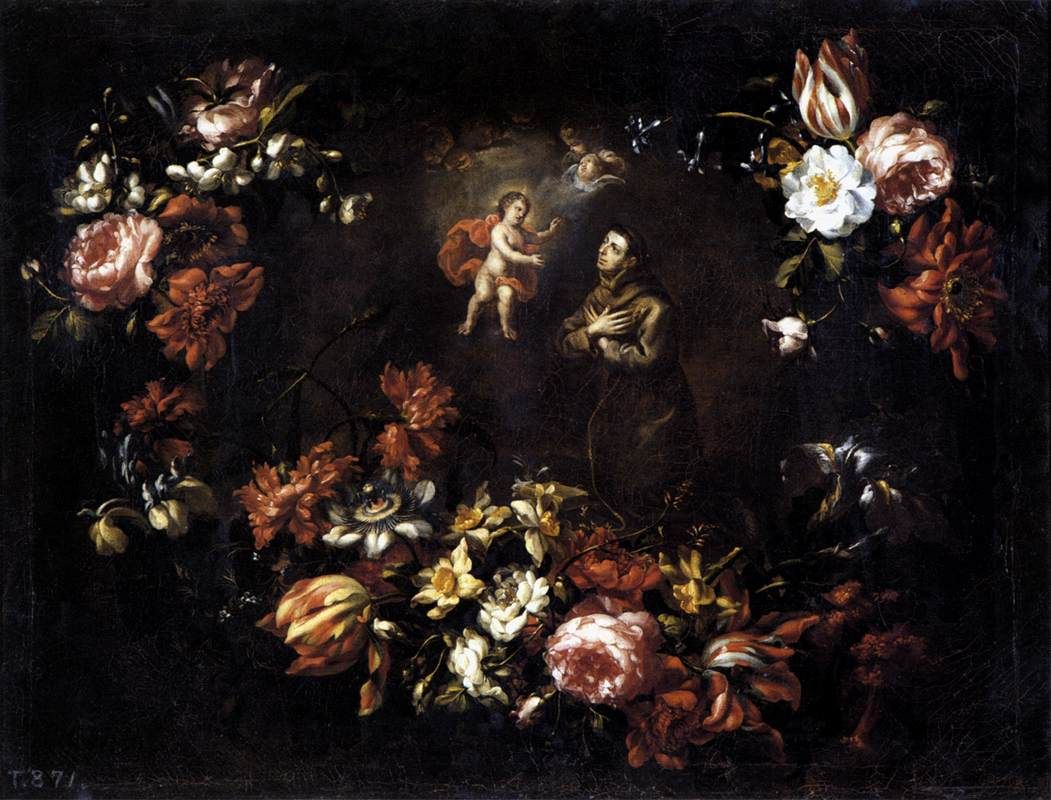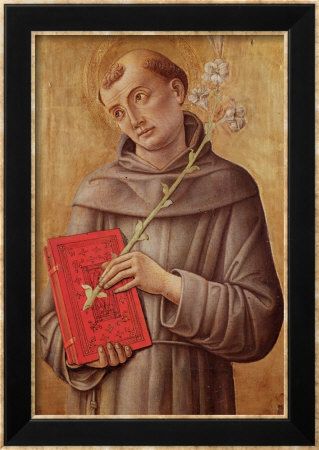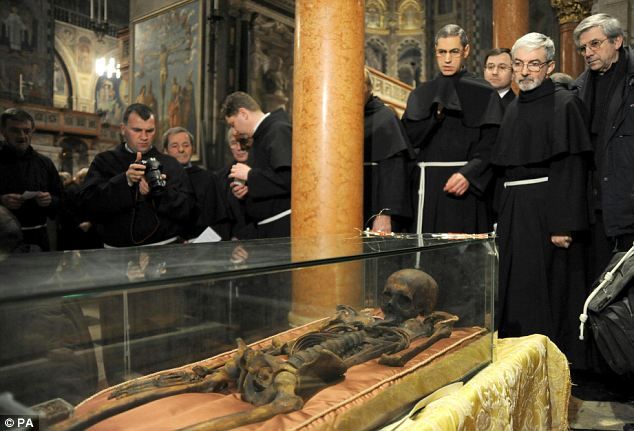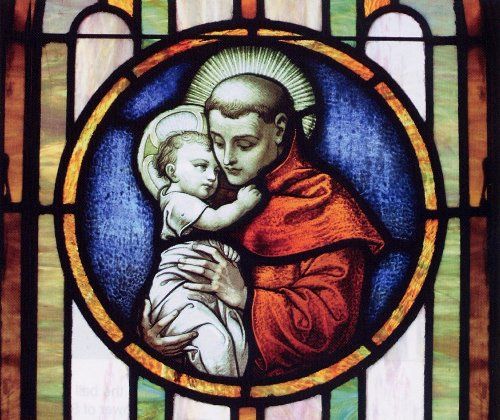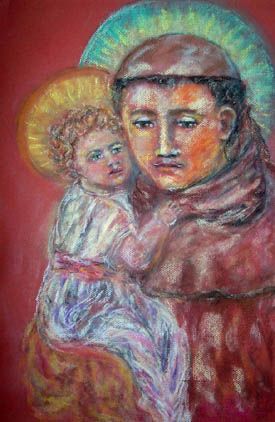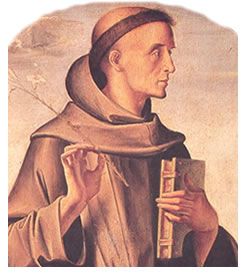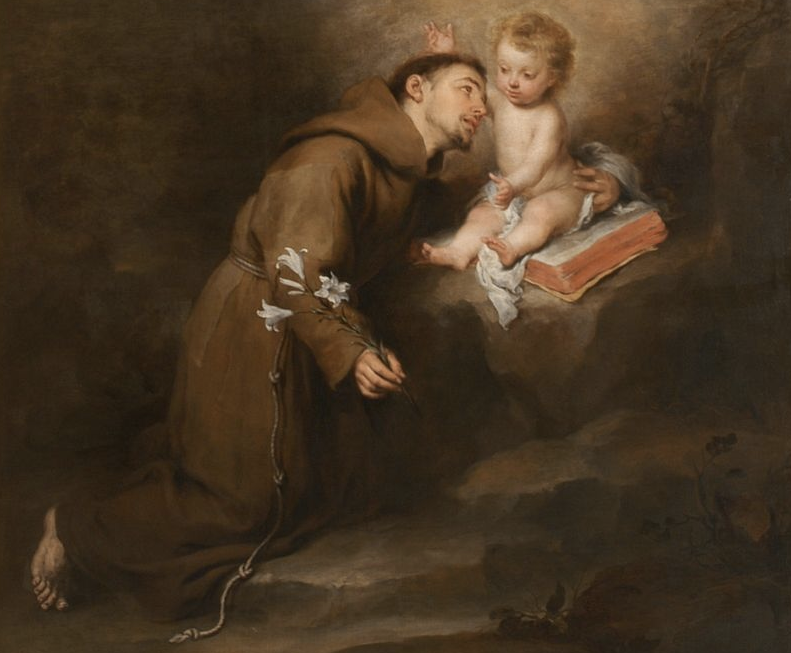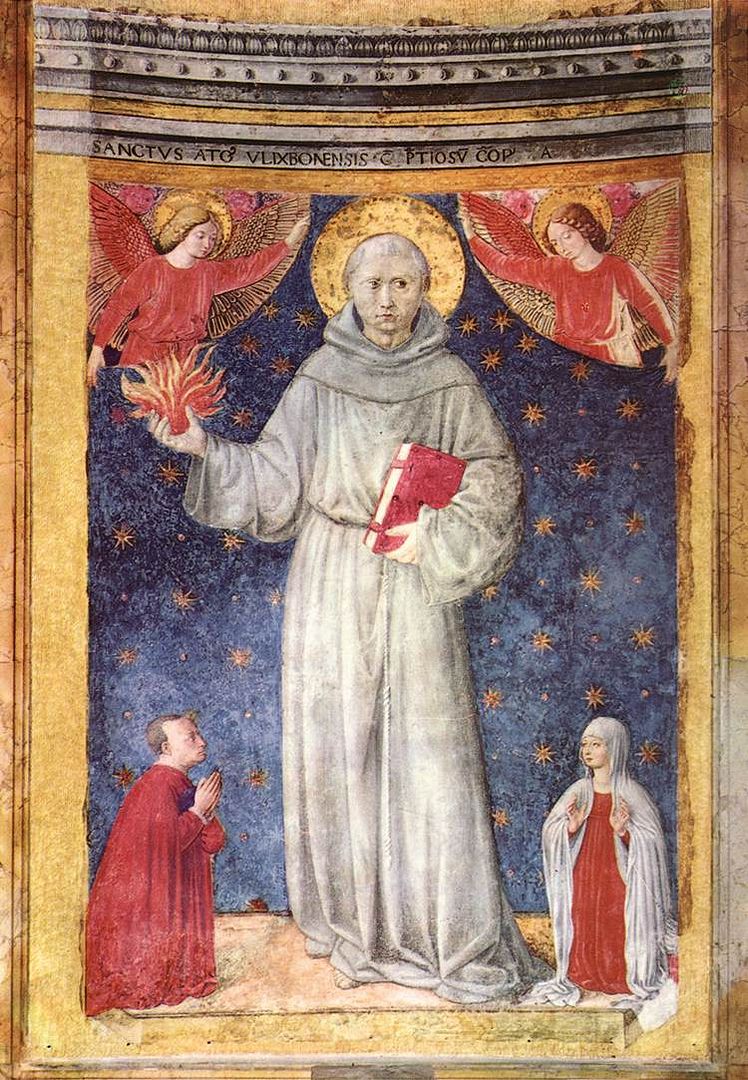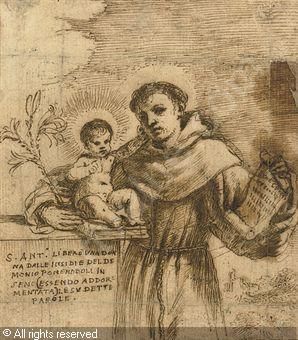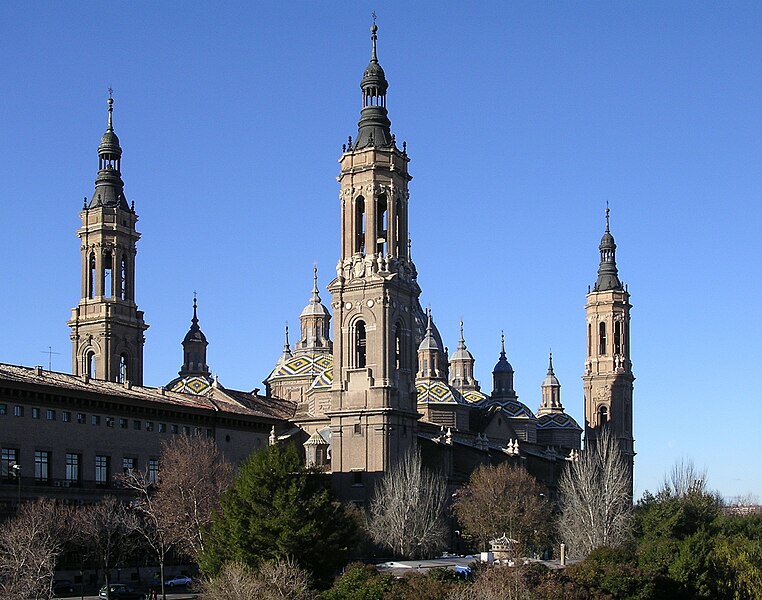Loving God, upon this daySing we all in joyful praise:Anthony, your faithful son,On this day has heaven won.He, the preacher of the Word,Lived in deed the truth he heard;Called by martyr's death to beVowed to holy poverty.Lord, accept the hymns we raise,Singing Anthony's holy praise!
Faithful friar, in Francis' stepBids us go where he has led,Drawn by him, we offer laudTo Christ Jesus, Son of God.Fearless teacher of the way,Guiding us to work and pray,Through his never-ceasing prayerLeads us Christ-ward ev'rywhere.Lord, accept the hymns we raise,Singing Anthony's holy praise!
To the Father and the SonAnd the Spirit, Three-in-One,Hymns of glory, songs of loveSing we, echoing those above.With the angels' chorus highEarth now makes this joyful cry;With Saint Anthony we sing,Praising God, our heav'nly King.Lord, accept the hymns we raise,Singing Anthony's holy praise! (J. Michael Thompson)
On June 13, we celebrate the feast of
Saint Anthony of Padua(1195-1231), Doctor of the Church, Confessor, Franciscan friar, and patron saint of lost items, travelers, and the poor. Saint Anthony’s life is one of preaching, writing, and prayer. He was canonized less than one year after his death, demonstrating the respect and veneration the Church held him in. In canonizing Anthony in 1232, Pope Gregory IX spoke of him as the “Ark of the Testament” and the “Repository of Holy Scripture.” In 1946 Pope Pius XII officially declared Anthony a Doctor of the Universal Church. Based upon his unending love for the Lord, the Church wants us to learn from Saint Anthony the meaning of true wisdom and what it means to become like Jesus, who humbled himself for us and served others without hesitation. Saint Anthony of Padua remains one of the most beloved and admired saints of the Church.
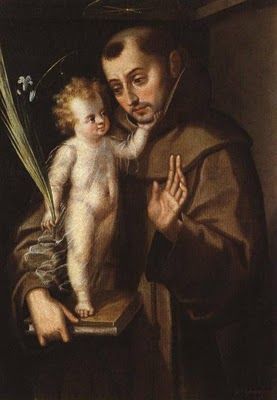
Saint Anthony was born Fernando Martin de Bulhom, in Lisbon, Portugal (not Padua, as is frequently assumed). Born into the royal court of King Alfonso II, as his father was a knight, he was afforded the best in education and living available at the time. His parents sent him to the Cathedral of Lisbon, where he was educated in both scholarly and spiritual matters by the clergy. By the age of 15, he had joined the Canons Regular of Saint Augustine. At age 17, he requested and received a transfer to the priory of Saint Cross (in Coimbra, Portugal), where he would be afforded more solitude and contemplative silence. There, he spent eight years in silent prayer and devotion, living and breathing the Scriptures.
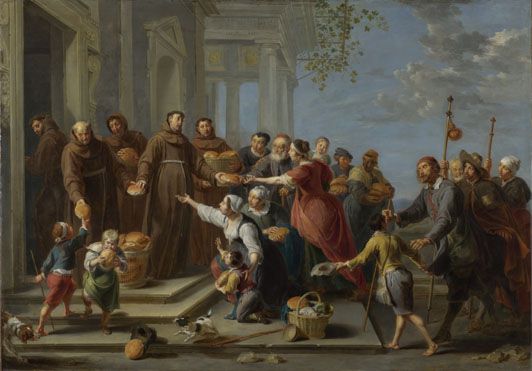
At 25, Saint Anthony was led to join the Franciscan Order (at which time he took the name Anthony in honor of Saint Antony of Egypt). Deeply inspired by the history of Franciscan martyrs, he strove to emulate the sacrifice of those who preceded him. He requested permission to journey to Africa on mission, and was granted approval, but became so ill upon arrival was forced to reboard his ship and return to Portugal.
En route home, a storm forced the ship to land off the cost of Sicily, where Anthony was housed by the Franciscans who lived there. He journeyed to Assisi, and served as chaplain to the hermits, performing the most menial of tasks, and practicing penance and mortification.
It was there, when forced via obedience to his superior to preach, that the Holy Spirit shone forth from Saint Anthony, and he earned a reputation for eloquence and ability. Saint Francis, who heard of the event, prescribed that Anthony preach throughout Italy, and later to teach theology to the brethren. Francis instructed that Anthony teach
“in such a manner that the spirit of prayer be not extinguished either in yourself or in the other brethren." Anthony continued to preach despite his busy teaching schedule, striving constantly for the salvation of souls.
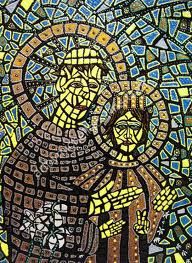
Saint Anthony’s sermons attracted large numbers of people—so many, that no church would accommodate the crowds. He took to preaching outside, and even in the rain, his listeners would remain miraculously dry and protected from the elements. Following preaching, he would hear confessions throughout the night, sleeping little, but unable to turn from those in spiritual need.
Miracles followed Saint Anthony. Once, while lodging at the home of a faithful man, Anthony was observed to be holding the Infant Jesus in his arms, surrounded by heavenly light. Additional miracles of healing, preaching, and conversion have been recorded.
Saint Anthony was eventually elected Minister Provincial of the friars, and maintained his fasting and penance. Eventually, he felt his strength waning, and prepared himself for death. After receiving the last sacraments he kept looking upward with a smile. When he was asked what he saw there, he answered:
"I see my Lord." Anthony died at the young age of 36, to the cries of children in the street: "The saint is dead, Antony is dead."
Anthony’s body was buried in the Franciscan Church of Saint Mary in Padua (from which his name originates). Canonized within the year, a grand basilica was built only 30 years later, and his relics placed beneath the alter. Upon translation of his holy relics, it was found that his body had been reduced to dust and bone, but that his tongue was incorrupt—intact and life-like. This was taken as confirmation of his gifts of writing, preaching, and teaching from the Lord. St. Bonaventure, who was present as minister general of the Friars Minor, took the tongue reverently into his hands and exclaimed,
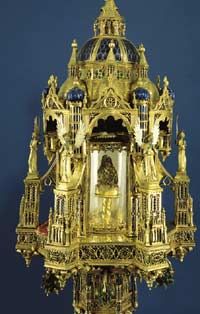 |
| Reliquery of Saint Anthony's Tongue |
"O blessed tongue, which has always blessed God and caused others to bless Him, now it appears evident how great were your merits before God!"Saint Anthony’s tongue was placed in a reliquary, and is still venerated today. From his death until the present day, numerous miracles have been reported at his intercession.
Saint Anthony’s teaching of the Catholic faith was simple and uncluttered, appealing to all, and understood by any who listened. He valiantly fought heresies by calling upon the Holy Name of Mary. When he found that he was preaching the true Gospel of the Catholic Church to heretics who would not listen to him, he went out and preached it to the fishes (in the process attracting a large crowd). This was for the glory of God, the delight of the angels, and the easing of his own heart. St. Anthony wanted to profess the Catholic Faith with his mind and his heart, at every moment.
Select Quotations of Saint Anthony of Padua:"The saints are like the stars. In his providence Christ conceals them in a hidden place that they may not shine before others when they might wish to do so. Yet they are always ready to exchange the quiet of contemplation for the works of mercy as soon as they perceive in their heart the invitation of Christ."
“Actions speak louder than words; let your words teach and your actions speak. We are full of words but empty of actions, and therefore are cursed by the Lord, since he himself cursed the fig tree when he found no fruit but only leaves. It is useless for a man to flaunt his knowledge of the law if he undermines its teaching by his actions.
But the apostles “spoke as the Spirit gave them the gift of speech.” Happy the man whose words issue from the Holy Spirit and not from himself!
We should speak, then, as the Holy Spirit gives us the gift of speech. Our humble and sincere request to the Spirit for ourselves should be that we may bring the day of Pentecost to fulfillment, insofar as he infuses us with his grace, by using our bodily senses in a perfect manner by keeping the commandments. Likewise we shall request that we may be filled with a keen sense of sorrow and with fiery tongues for confessing the faith so our deserved reward may be to stand in the blazing splendor of the saints and to look upon the triune God.”
"Attribute to God every good that you have received. If you take credit for something that does not belong to you, you will be guilty of theft.""The life of the body is the soul; the life of the soul is God.""These symbolize (Proverbs 30:14) the greedy and usurers whose teeth are swords and knifes which they use to devour the poor and steal their meager possessions. All of them are children of this world who consider the children of light to be stupid and believe themselves to be the prudent ones. Their prudence is their death.""Christ acts like a loving mother. To induce us to follow Him, He gives us Himself as an example and promises us a reward in His kingdom."
"The Glorious Virgin did not have a stain in her birth because she was sanctified in her mother's womb and safeguarded there by angels.""The spirit of humility is sweeter than honey, and those who nourish themselves with this honey produce sweet fruit.""Solicitude for material things distracts the soul and divides it. The devil seizes the divided soul and drags it to hell.""Christians must lean on the Cross of Christ just as travelers lean on a staff when they begin a long journey. They must have the Passion of Christ deeply embedded in their minds and hearts, because only from it can they derive peace, grace, and truth."
Saint Anthony’s BlessingBehold, the Cross of the Lord! Begone, all evil powers! The Lion of the tribe of Judah, The Root of David, has conquered! Alleluia, Alleluia!Prayer for the Help of the Holy Spirit (Written by Saint Anthony of Padua)O God, send forth your Holy Spirit into my heart that I may perceive, into my mind that I may remember, and into my soul that I may meditate. Inspire me to speak with piety, holiness, tenderness and mercy. Teach, guide and direct my thoughts and senses from beginning to end. May your grace ever help and correct me, and may I be strengthened now with wisdom from on high, for the sake of your infinite mercy. Amen.
O God, who by thy Holy Spirit didst give to thy servant Antony a love of the Holy Scriptures, and the gift of expounding them with learning and eloquence, that thereby thy people might be established in sound doctrine and encouraged in the way of righteousness, grant to us always an abundance of such preachers, to the glory of thy Name and the benefit of thy Church; through Jesus Christ our Lord, who liveth and reigneth with thee and the Holy Spirit, one God, now and for ever. Amen.
